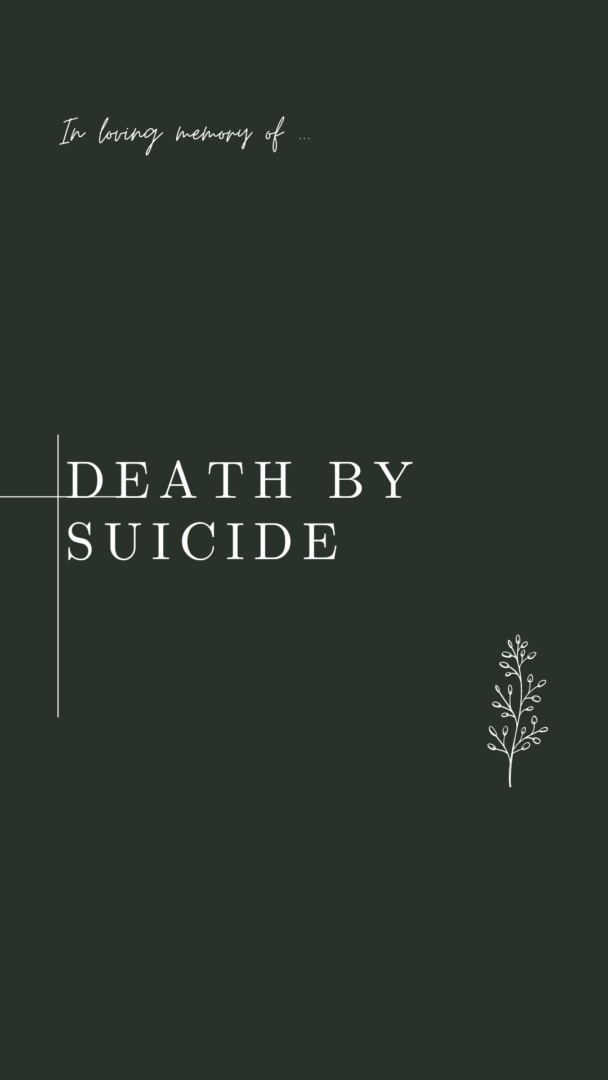
Death by Suicide Part 1
If you have lost someone to suicide, let me first start by saying that I am so sorry for your loss. Losing a loved one to death by suicide is like a triple whammy of losses: grief + sudden loss + trauma. Grief is what we feel as we process and try to make sense that our loved one is no longer here with us. Sudden death is a term used for any unexpected death, accidents, murder and death by suicide are all “sudden deaths.” Trauma can be present with sudden death. Trauma also may also be caused by abuse that may occur when living with someone with mental illness.
Suicide is caused by mental illness, a disease of the mind that takes over the whole body and takes away one’s ability to think clearly. It’s an illness, like cancer or heart disease. There is no blame, nor shame in losing someone to a disease, including mental illness. Their death may come as a total shock, or in other cases, may come after years battling mental illness, rage, addiction or estrangement.
Here are some things I found helpful after losing my husband to death by suicide.
Grief 101
Everyone’s grief is unique. No two people grieve the same way, and no one knows your loss.
Grief needs to be witnessed and family and friends may not be the right people to witness your grief. Getting support, outside family and friends, was essential for me. I found an online grief community that was, and still is, like a life raft in my ocean of grief. Find grief support, even if you think you don’t need it.
It’s important to be kind with yourself. Give yourself so much grace to simply be, however you are.
The brain doesn’t work the same. You are not the same. Life does not go back to being the same as it was before your loved one died. Don’t make that the goal. Instead, be open to a different life experience, one in which your loved one is not here physically. One that allows for grieving.
People will say hurtful things out of ignorance. They do not know what to say, and even the best-intentioned people may say things that sting. Forgive them.
When Nate died, I broke down. The feelings of shock, disbelief and pain were so far beyond anything I had experienced or felt in my life. If all my life experiences and feelings were within a circle of knowing – this was miles outside that circle. My mind could not understand what happened or what was happening. I was in complete shock and denial, for months. I now know this is normal. I remember trying to rewind times. I would replay different scenarios in my mind, asking what if I’d done X-Y-Z. Would Nate be alive today? I ran through the “what ifs” for months. I actually thought I could change what had happened if I wished it enough.
Guilt shows up in grief and may have an especially big role in death by suicide. You must know this is not your fault. We, those still here, feel responsible. How could someone want to die when I love them so much? Didn’t he/she/they know how important they are? Did I not tell them enough, show them enough, love them enough? Was I too absent, too critical, too self-absorbed, too … fill in the blank. What did I not see or do? We want to give ourselves more control and more power than we actually have. Our minds would rather feel guilty than powerless. That’s why the guilt is so big. The truth is, we are powerless. Death is beyond our control.
Grief has six non-linear “stages” that we move through as we try to make sense of not having our person in our lives anymore.
- Denial: Denial and shock are normal reactions to a death or loss. It is our body’s way of self-preservation. I wasn’t able to eat, sleep or do basic functions for months. Fortunately, I had amazing friends who swooped in and took care of me. For months, I felt like I was in a dream. My mind could not comprehend what happened or what was happening and couldn’t make simple decisions like, to walk upstairs or sit on the floor. I’m pretty sure I forgot how to use a fork, get dressed or spell my name.
- Anger: How could this happen? It seems so unfair, so wrong. We want to blame someone, anyone. Know that our minds would rather feel anger than feeling helpless. In death by suicide, anger can also stem from feelings of abandonment. How could he/she leave me?
- Bargaining: I would run through the last day, the last hour, the last moment I saw Nate, over and over. I’ve replayed it thousands of times in my mind, wishing I could rewind time, begging, to rewind time. “What if I had …” been more patient, called someone, done something sooner, answered the phone, not answered the phone, not been so angry, not been so busy or something else we think we could have done differently. This is really important – in death by suicide – their death is not because of anything that happened right before their death. Let me say this again. Death by suicide does not happen because of events that happen right before the death. In death by suicide, death is caused by mental illness, the brain short circuits, and the person cannot make rational decisions. This is not a choice. I ran through this over and over and over, positive that my husband’s death was a direct result of an argument we’d had that night. The reality is, we didn’t have an argument. He attacked me. And, he had been exploding with rage, anxiety, and emotional pain for a long time.
- Depression: In this stage, we begin to realize and feel the true extent of the death or loss. I’ve found this comes and goes, in and out like the tide. There are times I feel like, I’ve got this. I am here and I see my grief and see Nate’s not here and I’m okay. Other moments, I find myself unable to see any beauty in the world. This is normal. And, it’s also important to seek medical help if depression is debilitating, lasting longer than a year, or if you have feelings of self-harm. Call 988.
- Acceptance: In time, we can come to terms with all the emotions and feelings we experienced when the death or loss happened. Acceptance, like depression, like all the stages actually – comes and goes. We do not accept death once and that’s it. We must accept and accept and accept. Because denial, anger, bargaining also re-emerge. This is normal.
- Finding Meaning: In time, we find meaning through our grief, we see the wisdom that comes out of horrific experiences.
If you’ve lost a loved one to death by suicide, try this exercise – write down all the “What ifs”. What if …
Write them all out and look them over. What do you see? The reality is that nothing would have changed the outcome. We cannot go back in time and change what has happened.
Shame lives in darkness; It cannot live in the light. It is important for us, the ones still alive, to release shame, blame and guilt. These emotions are poison running through our veins. Put them out on paper, shine light on them, and know that there is nothing you could have done to change the outcome.
What you can do, is move into and through your grief and get support for your own healing. For me, I was fortunate to find a grief community right away. Slowly, by watching and listening and learning from others in grief, I came to know my grief so intimately.
Some things to know about logistical things in a death by suicide.
- The police will investigate. Either you found them, or you got a call. The medical examiner will do an autopsy to find the cause of death. This can take anywhere from 3-9 months or more. In Nate’s case, it took nine months. They will look at everything in your loved ones body, what they ate, drank, any substances. This is not a reflection of you. This is procedure and they need to rule out foul play. There are murders staged to look like suicides, so this is a necessary part of the after-death process. In that time, they may call you with questions.
- You will not be able to get multiple death certificates until after the medical examiner has rules “cause of death.” You will be issued one death certificate that says “pending investigation” and this is what you will use to show proof of death. Hold onto the original copy, because all financial institutions etc. need to see a death certificate.
- You can see the body. Have someone drive you and be there to support you. I am so grateful that I did see my husband’s body.
It is essential that you take care of yourself at this time.
Grief guru, David Kessler, talks about pain verses suffering. Pain is the hurt we feel at losing our loved one. Suffering comes from the secondary emotions that come along with loss: self-blame, asking why, the stories we make up about the death, feeling powerless, hopeless, angry. In the end, our loved ones are dead. No amount of bargaining can bring them back. We have to move through our grief in order to heal and live life fully, knowing they are in our hearts and always with us in spirit.
Sources: David Kessler, Death by Suicide Series, grief.com and Finding Meaning, The Sixth Stage of Grief.
